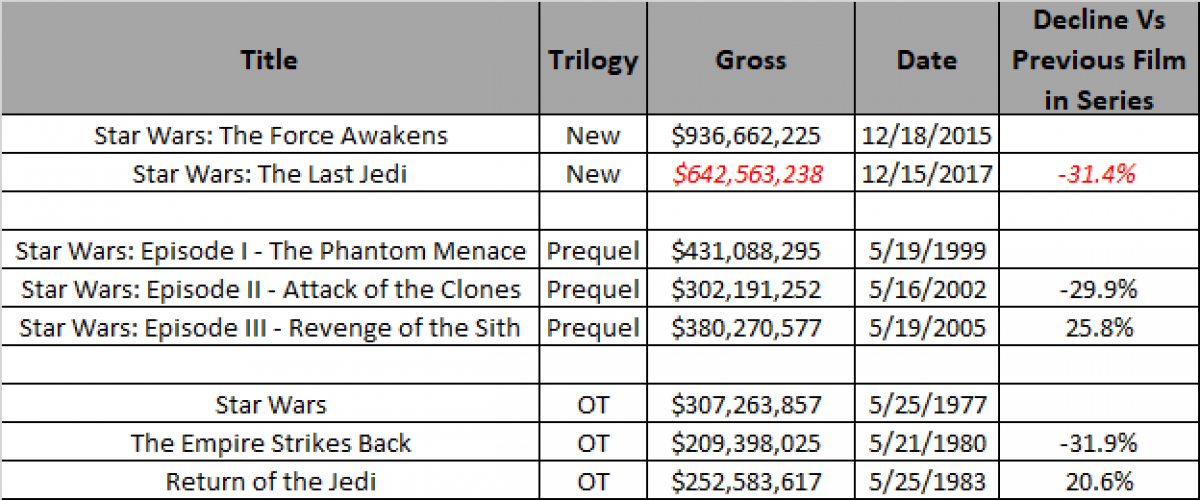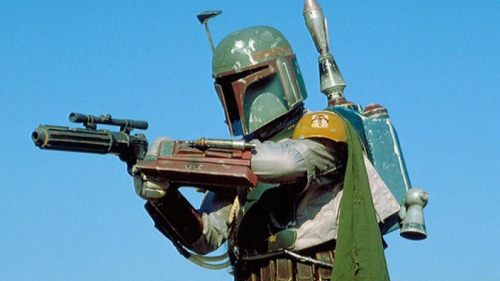Sunday Reads: STAR WARS, Sequels, And Looking At Franchise History To Find Box Office Trends
When I wrote about how The Last Jedi's Rotten Tomatoes audience score wasn’t reflective of its actual audience due to self-selection bias in RT's polling methodology and negative review bombing, I mentioned that the narrative around the film hadn’t been written yet. Well, that story is starting to come into focus. Factoring in a week by week decay and historical performances around January and February holidays, The Last Jedi will likely end up around $640 million in domestic box office (give or take $10m either way).

Is that good or bad? Is Disney happy? What were their expectations? We don’t have access to their greenlight, but we can apply some logical assumptions based on past Star Wars performances.
Let’s start by referring to screenwriter William Goldman:
“Nobody knows anything...... Not one person in the entire motion picture field knows for a certainty what's going to work. Every time out it's a guess and, if you're lucky, an educated one.”
Wiser words may never have been spoken regarding Hollywood and how movies get the ok to spend millions and millions of dollars getting made. No one knows the future. If anyone tells you they know what will work or what won’t work in Hollywood, they are selling you something and it’s probably fairy dust. The difference between movie execs and internet trolls is movie execs are (usually) looking at what’s happened in the past to make educated bets about what’s going to happen in the future.
Star Wars is currently the closest thing Hollywood has to a sure bet. While Disney’s aggressive plan to make a Star Wars every year will likely lead to some saturation issues, we aren’t there yet. That’s why Disney spent $4 billion bucks to get the rights to the IP. They guessed correctly that the pent-up demand to make Star Wars movies with the original cast would be one of the biggest releases in history. They also have been in the franchise business long enough to know that sequels produce diminishing returns so they likely did not expect The Last Jedi to reach the same historical heights The Force Awakens achieved. But what did they expect? They may have looked at how the last two Star Wars trilogies performed to have some idea.
One influential aspect of forecasting is being aware of seasonality or how movies perform differently because of the time of the year, so it's usually a bad idea to go back too far to predict future performance. The movie industry changes greatly over a few years, so execs usually only go back two, three, maybe four years when looking at past performance. But in this case, we’re looking at how the three movies in each Star Wars trilogy performed against each other, so we can have some idea how the three films in this current trilogy will perform; therefore seasonality isn’t a factor.

As you can see, there’s a trend in how the second and third film in each trilogy perform compared to the previous film. Both The Empire Strikes Back and The Attack of the Clones dropped around 30% compared to the first film while The Return of the Jedi and Revenge of the Sith rebounded to a 20% or 25% lift. The newest trilogy appears to be following the same trend as my forecast shows a projected drop of 31.4%, or around the same 30% drop as the previous two trilogies.
So, is this what Disney expected? No way to know, and they certainly won’t publicly say anything other than praise, but if they did look at the franchise history, they would not be surprised to see their latest entry coming in where it's looking like it will end up.



